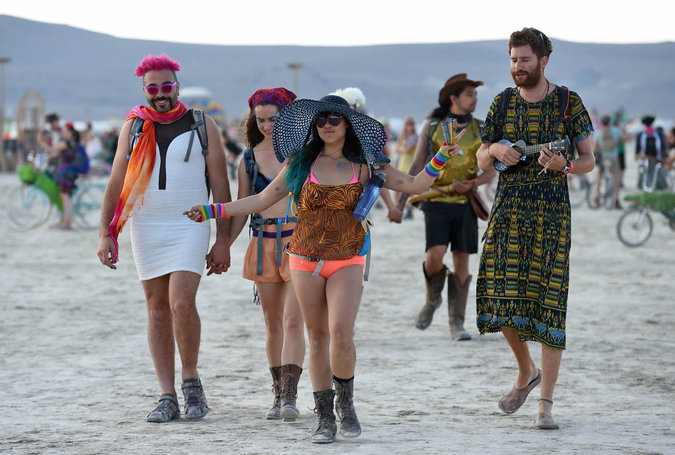It seems that Burning Man, the quintessential counterculture festival, has fallen victim to its own devices. Like Coachella and Bonnaroo before it, the sheer exclusivity and cultural significance of the Black Rock City experience has manufactured a large-scale event that’s on the brink of contradicting its own ethos.
Despite trying not to “sell out”, the sheer size of the event has required Burning Man producers to expand infrastructure, raise ticket prices and accommodate a new type of Burner on the playa.
The Unlikely Cost of Counterculture
Founded on a gift, anti-consumerist economy in 1986, Burning Man is described as a “crucible of creativity” dedicated to community, art, self-expression and self reliance. Attendees, known as Burners, must abide by the 10 principles during their eight day stay on the playa. This unique set of rules, including “Radical Self Reliance” and “Leaving No Trace”, creates a sort of alternate reality in which money, inhibitions and civility bear no importance and creativity and experimentation reign supreme.
Burning Man has since evolved into an international phenomenon, attracting some 65,000 Burners from every corner of the planet and selling out for the first time in 2011. Event prices have risen to $390 per ticket plus a $50 vehicle pass for the 2015 Burn. When you factor in the price of food, alcohol, transportation, camping, bikes, costumes and supplies, you’re looking at a $1,000 to $5,000 trip, depending on budget and where you’re commuting from.

The tech elite one-up each other at Burning Man. Source: The New York Times
The event also boasts a diverse list of attendees. From Silicon Valley tech mavens Mark Zuckerberg, Larry Page and Elon Musk to fashion A-listers Derek Blasberg, Poppy Delevingne and Candice Swanepoel, Burning Man has become a feeding ground for the rich, famous and creatively curious. With this wealthy clientele has come a surge of lavish Burning Man accoutrements, including thousand-dollar costumes, exclusive Burning Man parties, air conditioned camp sites and top-of-the-line catered food.
This shift bears a striking resemblance to that of the American music festival, now a cultural touchstone for celebrities, brands, corporate sponsors, vendors and the average American teenager searching for the perfect Instagram backdrop.
Remaining Down to “The Playa”
Despite growing popularity, founder Larry Harvey, the Burning Man team and the Burners themselves remain true to their roots.
Unlike mainstream music festivals, which have successfully monetized nearly every aspect of the festival experience, Harvey and company are steadfast in their commitment to counterculture. Aside from eliminating the cost of sponsors, vendors, camping, marketing and advertising, performers and stage construction through their unique festival approach, Burning Man also supports artists of the playa in the form of grants, distributing $1,000,000 in 2014 alone.
Burning Man also offers 4,000 low-income tickets at $190 a pop for those able to show proof of financial hardship. Event profits are mostly put towards law enforcement and medical services, government taxes and fees, rental equipment and the land itself, which cost over four million dollars in 2013 and increases each year.

Costumed Burners frolicking the playa. Source: The New York Times
As for the attendees, the Burning Man experience is worth every penny. Even the rich and famous Burners credited with the commercialization of the event have benefited from the experience:
“I like going to Burning Man,” said Google co-founder Larry Page in an interview with Vox. “[It’s] an environment where people can try new things. I think as technologists, we should have some safe places where we can try out new things and figure out the effect on society. What’s the effect on people, without having to deploy it to the whole world.”
Our Take
Burning Man is a rare example of an event unaffected by money, with the exception of the inevitable costs associated with increased demand. But if mainstream youth culture continues to appropriate countercultural ideals, then the term “counterculture” and the events associated with it will need a rebrand.
Do you think Burning Man is going mainstream? Share your opinion in the comments below or chime in on Facebook.








































